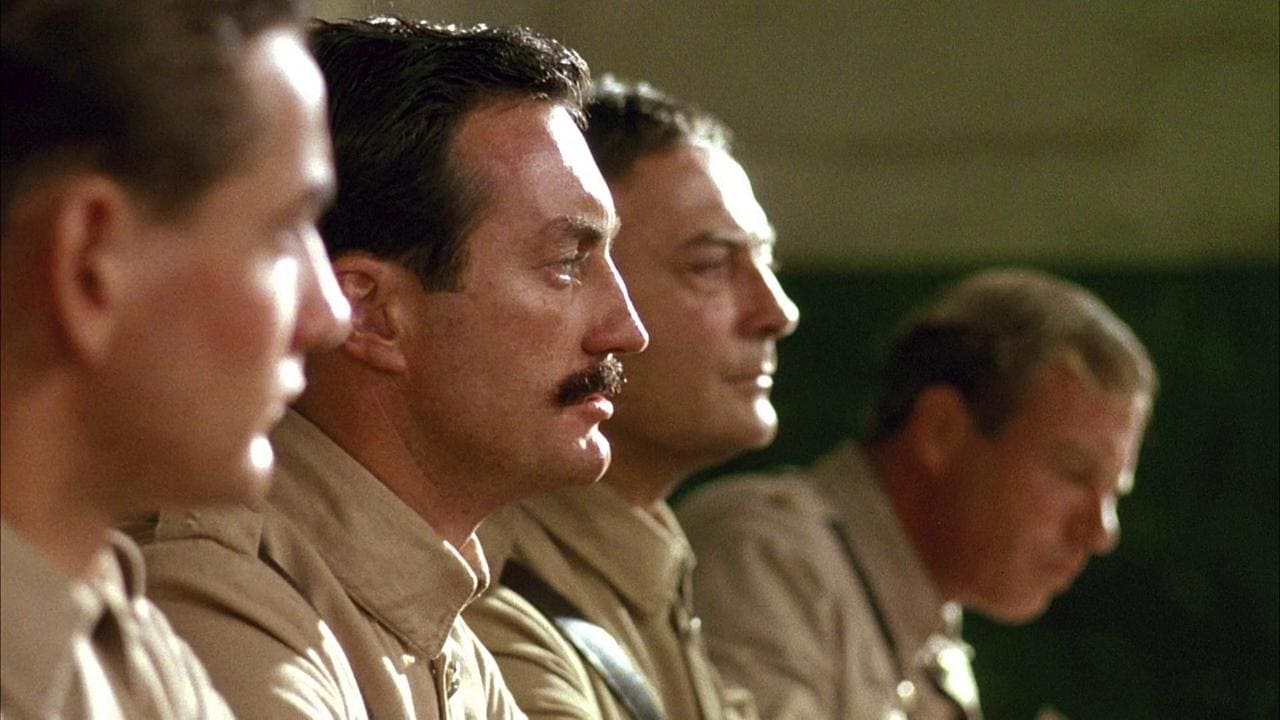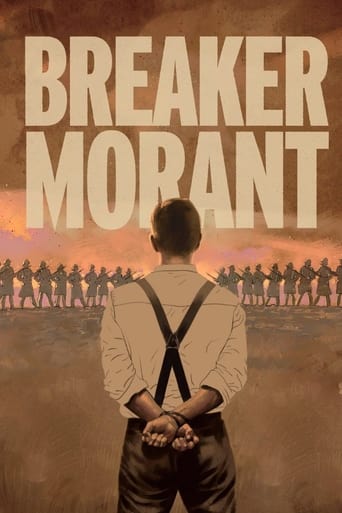GamerTab
That was an excellent one.
Roy Hart
If you're interested in the topic at hand, you should just watch it and judge yourself because the reviews have gone very biased by people that didn't even watch it and just hate (or love) the creator. I liked it, it was well written, narrated, and directed and it was about a topic that interests me.
Tyreece Hulme
One of the best movies of the year! Incredible from the beginning to the end.
Sarita Rafferty
There are moments that feel comical, some horrific, and some downright inspiring but the tonal shifts hardly matter as the end results come to a film that's perfect for this time.
atlasmb
"Breaker Morant" is one of the finest films ever made. A historical drama about the Boer War, it contains moments of humor and moments of heartbreak. It does many things and does them all well. It is about colonialism and the problems inherent in a war of occupation, matters of class, and the various ways that war results in dishonesty and betrayal.The film includes an amazing courtroom drama that works on many levels.It includes wonderful production values and memorable performances, especially by Bryan Brown (Lt. Peter Handcock), Jack Thompson (Major J. F. Thomas) and Edward Woodward (Lt. Harry Harbord Morant). Woodward's performance includes one scene that illustrates the power of the written word, specifically poetry, better than any other I have seen.Many war films have exposed the hypocrisies of war. Many have shown the ways it allows the uncaring to sacrifice others for worthless causes. "Breaker Morant" uses flashbacks and legal proceedings to unravel how such things can happen. It deals with honor and duty and contrasts them with other character traits that are counterfeits.I recommend this film to any adult who appreciates fine storytelling and a valuable message.
runamokprods
Based on a real life incident of Australian soldiers charged with murder -- for political reasons- - during the Boer war. Echoes of Kubrick's "Paths of Glory", but the morality here is more gray. These men have indeed done awful things, but only as part of a war full of awful things. Thus, while your heart is with the protagonists, there are moments you question them almost as much as the Kangaroo court they face. The acting is excellent throughout, and what was originally a play has been opened up just enough so as not to feel it, without feeling forced. Some of the moral complexities could have been explored with more depth, and there is a slightly disturbing suggestion of making "I was just following orders€™" a viable defense for war atrocities, but I'd much rather question an intelligent, challenging picture"s point of view, then not be challenged at all.
dolphin9731
I've seen this movie at least 20 times and know every line before it is spoken. It is safe to say that it an all time favorite for me. The movie, based on a historical event, is strengthened a great deal by the quality of the cast. It's difficult to find many movies with a lineup from a talent standpoint at the top that bests Edward Woodward, Jack Thompson and Bryan Brown. The script is very well written and acted out, but as with many movies based on an actual event, they choose for whatever reason to not be totally historically accurate. That is, if Kit Denton's book about Morant, "The Breaker" is correct. In the movie, three Australian soldiers are court marshaled for murdering Boer prisoners and a German missionary. In Denton's book, he lists 4 soldiers as court marshaled for those alleged crimes as well as killing a Boer child. In the movie, they are acquitted of killing the missionary, but found guilty of murdering the prisoners, for which Morant and Handcock are executed and Witten sentenced to penal servitude for life. In Denton's book, they are acquitted for executing the prisoners and the child, and found guilty of killing the missionary, for which Morant and Handcock are executed and Witton sentenced to life in prison and Lt Ivor Compton Summers, cashiered. The Boer prisoner Visser was executed by a quickly formed firing squad in the movie. According to Denton's book, Morant shot Visser himself, after giving him a rifle and telling him to "shoot, God damn you to hell". As the simple minded Visser held out the rifle to return it, Morant stepped toward him and shot him in the face. The movie was never based on Denton's book, although it was said to be by the book's publisher at the time. It was based on a stage play by Kenneth Ross. I believe Denton is most historically correct, after reading his book, when it comes to the parts related to the events the movie is based on. Denton though, prefaces his book by saying that the British government's refusal to release a number of essential documents make it impossible to be completely accurate. Denton's book preceded the movie, and some of the lines in the movie were also in the book, although not spoken by the same person. The lines ending with "We shot them under rule 303" were spoken by Handcock in the book rather than Morant. The lines about "I wonder how more serious things could be" were not said by Handcock after being chastised for his verbal exchange with Drummond, but by Witton after he became upset with questions about interrogating of Jacob Hesse the missionary. Witton, according to Denton, was not the mild mannered and soft spoken person the movie made him out to be. That part of him was actually more like Ivor Summers. Witton was closer to Handcock in personality according to Denton. The lines in the movie being similar or the same as lines in the book lend me to believe Ross used Denton's book as a source of info to help write his play that later became the screenplay for the movie. I'd have liked to have seen the movie been actually based on Denton's book, although it was still one of my favorite movies the way it was. The event did take place, and while there are differences between the movie and Denton's book, it is good to see this travesty of justice not totally lost in history.
simon_pdavid-1
I have been a fan of "Breaker Morant" for many years. It is brilliantly written, acted and shot and is definitely one of my ten favourite movies of all time. Among Australian movies only "The Year My Voice Broke" comes close. There is but one problem - the central premise is a load of nonsense.Morant shot no prisoners until his friend Captain Hunt was killed. The vague and conflicting orders under which he supposedly laboured, at the behest of cold blooded cynical politicians, did not, up to that point, move him to murder. And judging by the fact that he remained in his command there was apparently not, up to that point, a backlash from higher authorities. He was praised as an effective officer - so he did actually manage for most of his career to fight an unconventional war while remaining within some bounds of basic decency. What happened subsequently was purely an act of personal revenge. The crimes were not committed in the heat of battle. There was no pressing military exigency at stake which may excuse a blurring of the lines. No doubt Morant was disturbed at the loss of his friend, but you could say the same of many murderers. The law permits self defence, not revenge. In any case how did he know that the missionary was passing on information? Could he not have questioned him or impounded him for a couple of days instead?I appreciate the power of the "new war for a new century" sentiment and agree that we live in difficult times where the enemy are not always in uniform. But I cannot make the logical leap to the next level of self-justifying amorality. The British had plenty of facilities for prisoners in the Boer War - they ran entire concentration camps. I fail to see the moral complexity that is involved in the decision to shoot an unarmed prisoner or even the particular military purpose that could possibly be served by it. This is not The Caine Mutiny - Morant did not save the lives of his crew. It is precisely because your friends and enemies now look the same that you need to be more careful, not less. No doubt this is difficult both in Africa and in Iraq, but hey that's your job as a professional soldier (Morant was not a conscript). The alternative is the slippery slope to fascism upon which we've recently embarked. The power of this film is that it succeeds in making you believe that black is white.

